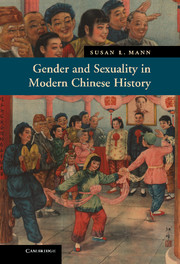Book contents
- Frontmatter
- Contents
- Figures
- Acknowledgments
- Preface: Does Sex Have a History?
- Introduction: The cloistered lady and the bare stick
- Part I Gender, Sexuality, and the State
- 1 Family and state: the separation of the sexes
- 2 Traffic in women and the problem of single men
- 3 Sexuality and gender relations in politics and law
- PART II GENDER, SEXUALITY, AND THE BODY
- Part III Gender, Sexuality, and the Other
- Permissions
- References
- Index
1 - Family and state: the separation of the sexes
from Part I - Gender, Sexuality, and the State
Published online by Cambridge University Press: 05 June 2012
- Frontmatter
- Contents
- Figures
- Acknowledgments
- Preface: Does Sex Have a History?
- Introduction: The cloistered lady and the bare stick
- Part I Gender, Sexuality, and the State
- 1 Family and state: the separation of the sexes
- 2 Traffic in women and the problem of single men
- 3 Sexuality and gender relations in politics and law
- PART II GENDER, SEXUALITY, AND THE BODY
- Part III Gender, Sexuality, and the Other
- Permissions
- References
- Index
Summary
Boji was a widow.…Once…she found herself at night in a house that had caught fire. Those nearby cried, “Lady, flee!” Boji said, “The rule for women is that when the matron and governess are not present, they do not leave the house at night. I await the coming of the matron and governess.” [The matron arrived, but the governess did not, and so]…she continued to stay there until the fire reached her and she died.…Thus did Boji fulfill to the utmost the duty of wifehood.
Liu Xiang, Lienü zhuan (Biographies of Exemplary Women), first century BCE, chapter 4.2 (O’Hara 1945:105).One year after my mother died I got a stick and a bowl and started out begging. It was the spring of the year and I was twenty-two. It was no light thing for a woman to go out of her home. That is why I put up with my old opium sot so long. But now I could not live in my house and had to come out. When I begged I begged in the parts of the city where I was not known, for I was ashamed.
Ning Lao T’ai-t’ai (Pruitt 1945:62)Boji was an aristocrat who lived before the first century CE. Ning Lao T’ai-t’ai was a working woman who came of age at the end of the Qing dynasty. Each articulates clearly a conviction that women belong at home, and that “coming out” risks shame and dishonor. To be sure, Boji was mildly ridiculed by a noted sixteenth-century scholar who found her story an example of womanly virtue taken too far (Handlin 1975:19–20). But the testimony of Ning Lao T’ai-t’ai shows that ideas about the proper separation of men and women retained their power into the twentieth century.
- Type
- Chapter
- Information
- Gender and Sexuality in Modern Chinese History , pp. 27 - 49Publisher: Cambridge University PressPrint publication year: 2011



